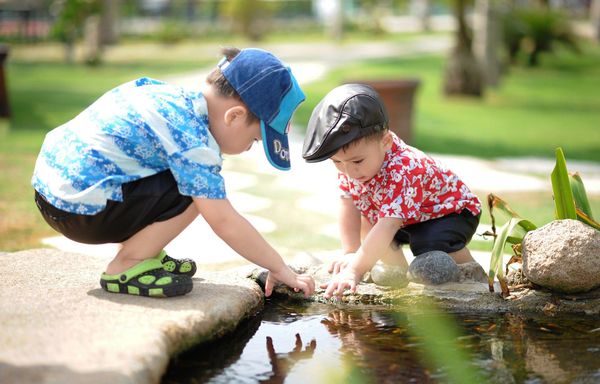I knelt in the soggy ground and raked my fingers through the dark soil, enjoying the sensation of dirt lodged underneath my fingernails and treating each worm I uncovered as if it were a piece of fine China. I painstakingly separated each of the roots from the small sprouts of kale I was planting and placed a small dent in the ground with the tip of my index finger. I gingerly placed one of the sprouts into the moist earth and covered its delicate roots with soil. My back ached and sweat collected on my brow, yet I had never felt so at peace. I glanced up at the beating Californian sun with a broad smile on my face, content in my newly established classroom.
For the past year, fellow students and I had been helping my teacher start this farm at our high school. Now, we were actually growing things in it. This was big. Through this farm, students were given the opportunity to learn where their food comes from and how it's produced, gain an appreciation and understanding of nature, and apply concepts they learned in their classes to a real-life scenario. In a matter of weeks, these kale sprouts would grow into adult plants for us to eat, while the students and I grow in ways we wouldn't be able to if we were confined to the indoors at a desk and chair.
Working on our farm every week made me realize, among many things, how removed we are from our food. If we’re in the mood for some fresh produce, we’re able to go to the nearest grocery store and pick out whatever we want from an array of fruits and vegetables, without giving it another thought. We shouldn't walk into a grocery store and take our abundant choices of produce for granted. Unsustainable agriculture methods, the main reason why there are so many choices at such a cheap price, are one of the leading causes of environmental damage. Through my involvement with my school's farm, I learned about the harmful effects of agriculture runoff, which produce algal blooms that kill marine life. I learned that with more the soil tilled comes more erosion caused to the land, therefore making it less fertile. I learned that there are ways to replenish soil nutrients naturally rather than with synthetic fertilizers, but due to corporations' greed these practices aren't being put to use. I learned how shipping produce is a major contributor to pollution and global warming. I learned about the rapid rate of deforestation in order to create more farmland.
When I walk into a grocery store, I am presented with the same choices as everyone else. But beyond these choices, I also see the degraded land, the destroyed habitats, and the wasteful practices we're supporting as consumers. All students deserve the chance to see these things as well. They should be given the opportunity to make thoughtful, educated choices about what food they're going to buy and where it comes from. There's no better way to do this than through the first-hand experience of working in a garden and actually applying these alternative methods.
There is, however, a valid concern that school gardening programs would take time away from studying for core classes that are necessary to graduating high school. First, let me just say that I highly doubt that a couple hours a week spent gardening would have such a negative impact on a student's grade that he or she would fail out of school. That being said, it is definitely a legitimate concern that students truly in need of academic help shouldn't be further distracted by extracurriculars. To me, however, this makes school gardens seem that much more necessary. Being outdoors gives students a break from the rigorous coursework that's expected of them, which can often times be so overwhelming that the mental state of far too many students is at risk. In addition, there are ways to incorporate what a student is learning in his or her classes to work being done in the garden.
I remember one time sitting in my garden, closing my eyes, and writing down the sensory details I experienced during my meditation session. Did this enhance my writing ability? Absolutely. Another time, my science teacher assigned a lab report on the plant growth of various species. Did this improve our science skills? Absolutely. When we were just starting to plan out the garden, I helped my teacher measure and draw a scaled model of the garden. Did this advance my math skills? Absolutely. In short, gardens would give students the chance to practice their skills in creative ways beyond the classroom, both helping them in their understanding of the material and relieving pressure caused by grades and tests.
Passing tests in high school is certainly important and necessary, but being able to apply what we learn in the classroom to real-life scenarios is even more crucial. Students shouldn't be factory-produced. They should be open-minded, enthusiastic learners who have an appreciation for our environment and an understanding of how their choices impact our planet. As I pull a perfectly ripened carrot out of the earth, I'm reminded of the hours I spent caring for these plants, protecting them from the winter frost and the sharp beaks of hungry birds. I am overwhelmed with a sense of pride and a single thought: Everyone should be given the opportunity to feel this same amount of pride. School gardens are an outlet for creative energy, community outreach, and experience-based learning – all students should be offered a way to exercise these fundamental principles, so let's start planting.





















